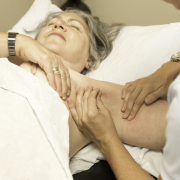Risk Factors for Lymphedema
Lymphedema is a condition that causes swelling in the arms or legs, likely due to damage to the lymph nodes. Patients who have undergone breast cancer treatment are at risk of lymphedema due to the damage the treatment may cause to the lymph nodes or a result of the removal of the lymph nodes. A blockage in your lymphatic system can prevent the lymph fluid from draining and cause it to build up. The function of the lymph system is to help rid the body of bacteria, viruses, toxins, and waste through the circulation of lymph fluid. Without draining well, the excess of lymph fluid leads to swelling.
Lymphedema is either primary or secondary. It can occur on its own or be caused by another issue, including some treatments. Learn more about the risk factors for lymphedema.
Primary Lymphedema Risk Factors
Lymphedema that occurs on its own may be a higher risk if you have Milroy’s disease, which begins in infancy; Meige’s disease, which usually occurs after puberty and under the age of 35; and Late-onset lymphedema, which usually begins after the age of 35. Primary lymphedema is often caused by inherited conditions relating to issues with lymph vessel development.
Secondary Lymphedema Risk Factors
Lymphedema that develops as a result of damage to the lymph nodes or vessels is called secondary lymphedema. You are at risk of developing it if you’ve had surgery to remove your lymph nodes or surgery that has caused injury to your lymph nodes. Breast cancer patients are at the highest risk of developing lymphedema. Other than surgery to remove lymph nodes, radiation therapy can also scar and block the lymph nodes. Secondary lymphedema from cancer treatment may occur months or years after treatment.
Furthermore, cancer may also cause lymphedema, especially if the growing cancer cells block the lymphatic vessels and the flow of lymph fluid. Other causes include infection of the lymph nodes which also blocks the flow of the lymph fluid.
Symptoms of Lymphedema
Lymphedema will produce symptoms that range from mild to severe, such as:
- Arm or leg swelling
- Swelling of the fingers and toes
- Heaviness or tightness in the arm and leg
- A feeling of discomfort
- A thickening of the skin
- Limited range of motion
- Recurring infections
If you notice symptoms of lymphedema and have known risk factors, make an appointment with your doctor as soon as possible. The earlier it is diagnosed, the better you can manage the condition.
Lymphedema Treatment in Kansas City and Marshall, MO
Our vein specialists at Missouri Vein Specialists regularly alleviate the symptoms of our patients with lymphedema. Our treatments include compression therapy, which helps decompress the limb and aids in lymphatic drainage. Dr. Scott Darling is certified by the American Board of Venous and Lymphatic Medicine and is the best vein doctor in KC.
If you have questions or if you would like to schedule a consultation with Dr. Darling, call our vein clinic at 816-792-3400 or use our online request form. Our friendly staff looks forward to serving you!





